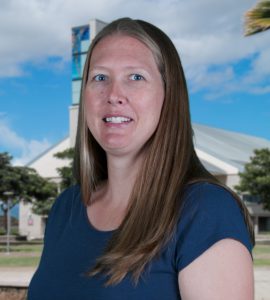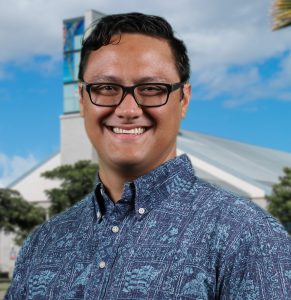A new summer bridge program for high school students and a teaching strategy workshop for educators are among the continued efforts of an initiative designed to promote the success of Native Hawaiian students in STEM.
Pūkoʻa Kani ʻĀina, a nearly $2.5 million grant funded by the National Science Foundation, was awarded in 2019 and runs through July 2024 at the University of Hawaiʻi–West Oʻahu. The program is dedicated to providing students with relevant, engaging curriculum that infuses indigenous learning and western knowledge to enhance the students’ experiences and education in STEM.
Led by UH West Oʻahu’s Dr. Kamuela Yong, associate professor of Mathematics, and Dr. Megan Ross, assistant professor of Biology, Pūkoʻa Kani ʻĀina aims to provide students with the technical skills necessary to excel in STEM careers, while remaining grounded through culture and community.
Yong will discuss Pūkoʻa Kani ʻĀina at an “On the Horizon” webinar titled, “Kanu Kumu O Ka ʻĀina: Planting Teachers of the Earth,” which is scheduled for 11 a.m. on Thursday, Oct. 28, via Zoom. Register for On the Horizon here. They will be among the guest speakers at the event, which is part of a series presented by the UH Office of Alumni Relations and UH Foundation that aims to showcase programmatic endeavors, campus goals, and opportunities for support at UH’s 10 campuses.


According to a previous article about Pūkoʻa Kani ʻĀina, the project will provide UH West Oʻahu with funding to increase the number of students enrolled in STEM programming, as well as aid UH West Oʻahu in developing a plan to enhance the STEM degrees, concentrations, and certificates to be offered at the school, while supporting the building of a transdisciplinary, sustainable STEM ecosystem within the university.
“This past summer, we had our first summer bridge program and the cohort of students who completed this program will be supported through seminars and professional development, as well as future research opportunities,” Yong said.
The Pūkoʻa Kani ʻĀina summer bridge program prepares graduating high school seniors for enrollment in the Bachelor of Science in Natural Sciences degree with concentrations in Applied Mathematics, Life Science, or Health Science at UH West Oʻahu. The program offers an opportunity for incoming freshmen to participate in a transdisciplinary, culturally based curriculum as well as a mentoring program.
While the Pūkoʻa Kani ʻĀina grant focuses on STEM success among Native Hawaiian students, it also supports educators with such shared endeavors.
“A convening in November 2019 held by Pūkoʻa Kani ʻĀina identified areas to work on and begin communities of practice,” Yong said. “One of these areas was to infuse ʻike Hawaii (knowledge) into the STEM curriculum.”
The grant supported a teaching strategy workshop in spring and summer 2020. UH West Oʻahu faculty who teach classes in the STEM discipline were invited to participate in the workshop led by Walter Kahumoku, III to provide training in strategies to engage adult learners to create a collaborative learning environment, Yong said.
The workshop provided faculty with the knowledge and skills to implement these strategies that incorporate ʻike Hawai‘i (knowledge), Nohona Hawai‘i (way of life), and ʻŌlelo Hawai‘i (language) into their work with students. Each session was designed to address a specific aspect of course development working toward the design or redesign of STEM related courses to include transdisciplinary or ʻāina-based pedagogy, he said.
“Workshops included discussions based on relevant literature, collaborative activities to apply concepts to course design, guest speakers, opportunities to meet community partners and fellow faculty to facilitate inclusion of ʻike Hawai‘i and ʻāina-based experiences into their curriculum,” Yong said.
The workshop included UH West Oʻahu faculty and lecturers from mathematics, biology, physics, geology, community health, health information management, business administration, and social science.
